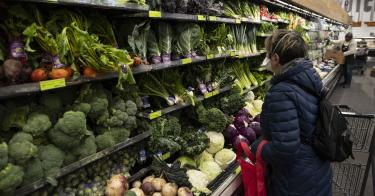The Wall Street Journal recently ran a thinly veiled harangue titled “To Save Money, Maybe You Should Skip Breakfast.” Dripping with elitism, it not only presumed to lecture Americans, but it also incorrectly cast the blame for today’s high prices on everything from the weather to the war in the Ukraine, instead of addressing the root cause: government spending.
Perhaps because the Journal misdiagnosed the cause of high food prices, it also recommended the wrong treatment. The condescending suggestion to simply skip a meal is the kind of nonchalance that comes from those unaffected by the common man’s economic ills.
One can imagine the ruling elites looking down and saying, “You silly proles. Solving your cost-of-living crisis is so simple: just cut one-third of your calories.”
The higher price of breakfast food is especially troubling for low- and middle-income earners who used to rely on consumer staples like eggs as a very inexpensive source of protein and vitamin D. Unfortunately, a dozen eggs cost 72% more today than they did three years ago.
>>> Blame Washington, Not Grocery Stores, for Food Prices
With the explosion in food prices, it’s no wonder families are going into credit card debt just to buy groceries.
While it’s true that certain specific food prices have increased recently because of world events, weather patterns, or other temporary issues, food prices in general have risen dramatically.
According to the Bureau of Labor Statistics, they’re up an average of 21%, with many consumer staples—like eggs—up much more than that.
Food prices in general are relatively volatile, and some are highly seasonal, enough so that they are excluded from so-called “core inflation” measures. Even still, food prices did not suddenly explode in the last month or so. Rather, they’ve been marching higher for three years.
If recent random events around the globe are not to blame for high food prices, then what is? In brief, government spending.
If the Biden administration and big spenders in Congress—from both political parties—had simply allowed one-time emergency COVID spending to expire, the federal government would have a balanced budget today. Instead, they replaced those trillions of dollars with new and wasteful spending, thereby cementing multi-trillion-dollar deficits.
A large portion of those deficits were financed by the Federal Reserve simply creating the money whole cloth. By increasing the quantity of money without a commensurate increase in the size of the economy, the value of money declined. That’s what inflation is.
President Biden himself even articulated this phenomenon once when he was giving a speech in Baltimore. He correctly explained that by the government shutting down the economy and reducing economic activity while also creating money and handing it out to people, prices were pushed up.
There’s no doubt that disruptions like the avian flu, which killed many chickens, caused the price of eggs to rise temporarily. But even after the supply of chickens recovered, egg prices never returned to their level from three years ago. That’s because the dollar doesn’t go as far as it used to.
>>> Scranton Joe and the Temple of Doom Spending
One of the functions of money is a measuring tool, which allows you to compare many different things at once based on price. But inflation shrinks this measuring tool, so that you need more units to measure the same thing.
For example, if a yardstick shrunk to just 30 inches, you would need 20% more of them to measure from one endzone to another on a football field. The field didn’t get bigger—the yardstick got smaller.
By spending trillions of dollars it didn’t have, the government created 40-year-high inflation and a cost-of-living crisis that has disproportionately affected low- and middle-income earners.
Because the elites have escaped this scourge largely unscathed, they can produce exceedingly out-of-touch recommendations, like cutting out a third of your food intake. Any economic situation, inflation or otherwise, which produces such a disconnect between classes of people has a destabilizing effect on a country.
All the more reason we must reduce inflation and government spending. It sure beats skipping breakfast.
This piece originally appeared in The Washington Times




